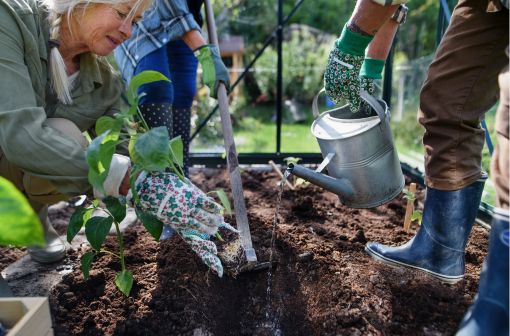Tags: Community & relationships Relationships Achieving in life Future security Staying independent
“My parents aren’t in residential aged care, and that is because over time they’ve accepted assisted living and gotten more and more help.”—Jean Kittson, author of We Need to Talk About Mum & Dad
Key points
- The idea of in-home help can challenge your parents’ sense of autonomy. But the extra support can help them to be more independent, not less, and to continue to age well at home.
- Goal-setting will help to identify support your parents need to continue to doing the things that give their lives meaning.
- When it comes to funding in-home support, there are two government schemes available: Commonwealth Home Support Programme, for low-level needs; and home-care packages.
- It can take a long time to get your parents assessed and approved for funding, so it's important to start the "extra help" conversation with them as soon as possible.
As your parents get older, you might notice some changes around their house. The laundry is stacking up, food in the fridge is going off, or the carpet needs a good vacuum. Or perhaps you’ve noticed a change in your parents themselves—the shopping is getting harder to carry, they’re eating less, or they’re not going out as much.
These could all be signs they need some extra help around the home—but getting your parents to accept that they need help might be a different question altogether.
We asked Australian Unity's CEO of Home Health, Prue Bowden, and performer, author and host of ‘Parenting Up with Australian Unity’, Jean Kittson AM how to navigate these conversations, and how in-home help can be used to help your parents stay independent for longer. Here's what they had to tell us.

Helping your parents to stay independent
We all want what’s best for our parents, but be prepared: when you bring up the subject of in-home help, you’ll probably encounter some pushback.
“There’s always resistance,” says Jean. “If you say, ‘Do you need some help cleaning around the house?’ They’ll say, ‘Why?!’ They’ll bristle. ‘Are we not clean?!’”
This is only natural, as these questions go straight to our parents’ independence and pride. But although this is a tough conversation, it’s a very important one, says Prue. By getting your parents the support they need, you can help them to maintain their independence for longer, do the things that give their life meaning, and continue to age well at home. It's a tricky discussion with far-reaching benefits: after all, a sense of purpose is an important factor in our wellbeing.
Jean’s parents are a perfect example. Her mum is 99 and her dad is 96, yet they’re still living independently in a retirement unit, thanks in no small part to assisted-living support and home-care packages.
“They’re not in residential aged care, and that is because over time they’ve accepted assisted living and gotten more and more help,” says Jean.
Sign up for wellbeing news
Get real wellbeing news, information and tips straight to your inbox.
Defining and achieving their goals
If your parents have agreed to consider some help, what's next? For Prue, the first step is understanding their goals. “When people come to Home Health for support, the first conversation we have with them is ‘what are they trying to achieve?’” she says. “It might be that they want to be able to continue to walk to the local shops and back, or it might be that they want to be able to still do some gardening.”
“There’s always resistance. If you say, ‘Do you need some help cleaning around the house?’ They’ll say, ‘Why?!’ They’ll bristle. ‘Are we not clean?!’”
—Jean Kittson, author of
We Need to Talk About Mum & Dad
If they’re still able to perform those activities, great—then it’s about maintaining their strength and capacity, perhaps through early intervention from a physio or occupational therapist. If a person is no longer able to achieve their goals independently, the question then becomes “how can we support them to achieve those goals?” says Prue.
.jpg?h=650&w=1200&hash=16AF56345548423728EF6C3B721697CA)
Accessing funding for in-home help
Before you start working with a home-care provider such as Home Health, you may need to look into funding arrangements.
“There are two different funding schemes available to help people age well at home: the first is the CHSP [Commonwealth Home Support Programme], and that’s really more low-level entry,” explains Prue. “It’s really that first step of need, and it usually starts with those supports around domestic assistance at home, and can progress to more personal care as well.
“But as someone who’s ageing at home starts to have more complex needs, then it’s the home-care packages that will more likely be the funding stream. And there are government tools available to support assessment to figure out which stream of funding is best for your parent at a particular time.”
The different types of home-care support
There are broadly four levels of home-care packages, which are based on the complexity of an individual’s needs. They provide for a range of supports and services—from physical and personal-care needs, to rehabilitation, to supporting cognitive decline.
“Each package has a different funding limit attached to it, but it’s all personalised,” says Prue. “And, most importantly, home-care packages are really consumer-directed. So, it’s really up to the consumer to have a very strong voice in how the funding is used to benefit their care.” (That’s where the goal-setting comes in, she adds.)
These packages are means-tested, but you can also get support from private providers. And some, like Home Health, also offer blended arrangements, where you’re funded up to a point and then pay out-of-pocket for additional services.
“It’s really up to the consumer to have a very strong voice in how the funding is used to benefit their care.”
—Prue Bowden, CEO of Home Health,
Australian Unity
Prue says most people start at Level One, basic domestic support, which consists of light housekeeping and other duties around the home. It can also include help with shopping and maintaining a well-stocked fridge.
As the complexity of their needs increase, there are provisions for all sorts of other services—including physio, podiatry, dieticians, food preparation, and driving support. The funding can also cover mobility aids and modifications around the home.
.jpg?h=650&w=1200&hash=07D89A21FBC51D91904132A6DC175EFD)
The importance of starting early
If Jean has one piece of advice, it’s to get in the My Aged Care system early, because the assessment and funding-allocation process can be lengthy.
“The really important thing, if you want to help your elders as they age, is to book an assessment—that’ll take weeks,” she says. “And once your loved one is assessed, then you wait and wait and wait, and then that’s when they tell you what level of care you are entitled to, and then you wait for that package to come. And sometimes that can be months, but sometimes, if it’s high-level, it can be years.
“The most important thing is to get in soon—get in when your loved one is a ‘Level One’. Get in the system, get registered, get the reference number, and then you can have access to the most amazing help—because it takes a team, a lot of collaboration, a lot of resources to help your elder to age well,” explains Jean.
“Don’t delay in having that initial conversation with your parents,” agrees Prue. And don’t forget to keep listening to your parents, and putting them at the centre of every conversation and decision.
A final piece of advice from Jean and Prue? Double-down on the message that getting help is about giving them more independence and autonomy, not less. The sooner they can get some extra support, the better off they’ll be in the long term.
Choosing the right provider
One of the objections you’re likely to get when you talk about home care with your parents is that they don’t want strange people coming into their home—and that’s fair enough.
Your parents need to be 100 percent comfortable with the people coming into their home, so it’s important to do your due diligence when choosing a home-care provider.
“I think really looking at the providers, looking at the quality of their workforce and the availability of the workforce to care for your parent is really important,” says Prue. “Ask some probing questions about the stability and consistency of the team that would be assigned to care for your parents. Quality care is the most important aspect to be looking for.”
To understand more about how Australian Unity can help support your parents live independently at home, visit Home Care Services.
Disclaimer:
Information provided in this article is not medical advice and you should consult with your healthcare practitioner. Australian Unity accepts no responsibility for the accuracy of any of the opinions, advice, representations or information contained in this publication. Readers should rely on their own advice and enquiries in making decisions affecting their own health, wellbeing or interest.


